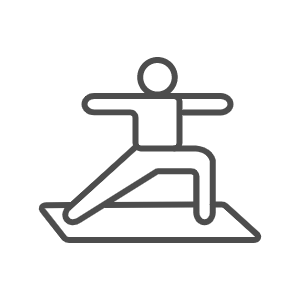
NEW In!
PURE-Matte Light TaupeShopping cart
Your shopping basket is empty
Free shipping from €39
Produced Ecologically & Fair
For All Yoga Styles
Yoga

Meditation
Sets & Bundles
It is no longer a secret that meditation has a positive effect on health. Perhaps you have already toyed with the idea of trying meditation? If so, here are the best tips for getting started and five very simple meditation exercises that you can incorporate into your everyday life at any time!

Meditation in any form is an enrichment for everyday life. We can get even more out of meditation practice if we keep a few things in mind before we start. The most important basic rules for meditation beginners are:
No meditation master has fallen from the sky. You will always have days when your mind wanders. That's part of it.
When you meditate, there is no goal. You don't have to prove anything to yourself or others, so accept each meditation as it is. If it only lasts two minutes at the beginning, that's worth just as much as half an hour. At the end of the day, all that matters is that you took the time.
Not everyone meditates the same way. It will probably take you a few tries before you find the approach that works for you. That's perfectly fine too.
If you have this mindset.
If you take this approach into your meditation practice, nothing can really go wrong and you are ready to go. You don't need any specific equipment, just a quiet place,comfortable clothes and a cushion to sit on in the beginning - and, of course, your breath.
The following exercises to reduce stress can be done at home, outdoors or even in the office. By the way, the times given are only suggestions - your meditation time-out should not be cancelled because you can only do five minutes instead of 15. It's the attempt alone that counts.
In this meditation exercise, you work with your breathing. Breathe in through your nose three times and out through your mouth. Count to four on the inhale and to eight on the exhale. After the three breaths, breathe only through the nose for about five minutes.
By concentrating on your breath, you will not only soon become calmer, your brain will also gain renewed energy and after just a few minutes you will be able to concentrate better again. This meditation exercise is thus wonderfully suitable for your lunch break at work.
When we think of meditation, we often think of the traditional "Om" - and not without reason, because a mantra helps you meditate. But it doesn't always have to be the Sanskrit syllable "Om" - you can choose your own mantra.
You can set a timer for your meditation, which should bring you out of meditation after a few minutes with a gentle tone. Now you can find a comfortable position and match your mantrato your breaths. Say it out loud or silently chant it in your head. It may also help to think of a beautiful place or something positive. Simply stay with your mantra and let it guide you through the meditation.
Meditation does not necessarily have to take place in a rigid position. You can also meditate while walking: find a short distance to walk up and down. Don't stray from this path and concentrate on feeling every muscle in your legs as you walk. You can also recite a mantra silently to yourself in rhythm with your breathing and walking.
In this meditation exercise, the focus is again on the breath. You sit (or lie) very still and pay attention only to your breathing for about five to 15 minutes. As soon as your thoughts wander, you direct them back to breathing. You may even manage to stop thinking about your breath and create complete silence in your mind. Not to think, however, is far from easy. So don't be too hard on yourself if this exercise proves more difficult at first.
This is where all five senses come into play. For 30 seconds each, concentrate on seeing, hearing, smelling, touching and tasting. In between, always try to switch off for 30 seconds so that you are ready for the next sense. Repeat the concentration on the senses three times. This exercise is good for the evening as it gets you in the mood for sleep.
We are used to always having a goal. That's not generally a bad thing, but it can also degenerate into stress and pressure to perform. Meditation offers an important counterbalance here, because whoever meditates is not working towards a specific point. This is true for everyone who tries meditation.
With the above exercises, you can experiment to see which type of meditation suits you best. It may take a while to find a routine - yet your contentment and your body will thank you for it. So just go for it and find out how beneficial regular meditation can be.
If you need extra help getting started with a regular meditation routine, we have here 4 steps to help you get started. For extra motivation, try our 7-day meditation challenge, where you can try meditating every day for a week.


You've probably seen them adorning fabrics, candles and pieces of jewellery: the flower of life is a popular decorative element. However, there is ...
Continue reading
Yoga is a practice that is thousands of years old and yet it is constantly evolving. The best example of this is Jivamukti Yoga, which was founded...
Continue reading